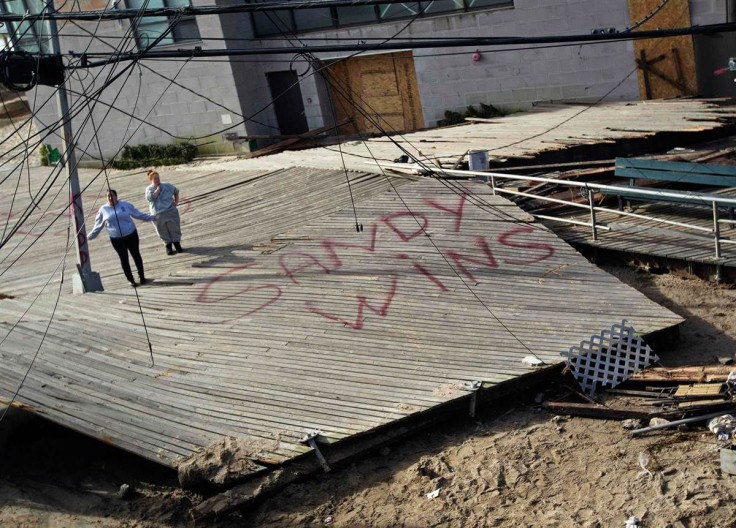Hurricane Sandy Did What Osama Bin Laden Couldn't Do: Stop The NYC Marathon
The NYC Marathon Ends Its 41-Year Streak

Tens of thousands of amateur, devoted athletes compete every year for the limited number of slots in the New York City Marathon, an event so important to its organizers, promoters and, most of all, participants that not even the Sept. 11, 2001, attack on the city forced its cancellation.
In the end, it wasn’t an act of terrorism that ended the race’s 41 consecutive years but rather an act of nature. Eleven years ago, the race became a symbol of New York’s resilience when then-Mayor Rudy Giuliani refused to cancel the event held while the World Trade Center site was still a massive pile of rubble strewn with human remains. At the time, the city’s 107th mayor was speaking loftily about New Yorkers’ refusal to give in to fear. Thousands of runners were flocking into the city to participate in that act of resolve. That year, Kenyans Martin Lel for the men and Margaret Okayo for the women won that race, in which a record 34,729 runners participated.
Giuliani’s successor, Mayor Michael Bloomberg, had hoped to repeat this sentiment of resilience when he initially announced the show would go on two days after Broadway reopened for business. But on Friday, he changed his mind after getting slammed by many for appearing like a billionaire mayor seemingly unaware of the suffering of the hoi polloi freezing in darkened high-rises in the Lower East Side or struggling to rebuild their lives after the storm surge wiped out their homes in Staten Island, where the race begins in its path through the five boroughs.
As recently as Friday afternoon, the mayor was resistant to altering the course he had embarked on, conjuring up Guiliani’s rhetoric that the marathon would be a symbol once again.
"It (the marathon in 2001) pulled people together, and we have to find some ways to express ourselves and show our solidarity with each other," he said at a press conference. "You have to keep going and doing things, and you can grieve, you can cry and you can laugh all at the same time.”
Almost immediately, the mayor’s comments were slammed by victims of the storm’s fury.
"He's supposed to be the mayor of all the city, but he's really the mayor of Manhattan,” Staten Island resident Joan Wacks, whose home was flooded, told the Associated Press.
Then, just three hours after making his comments, the mayor backed off and announced marathon would be cancelled, calling the event a distraction.
"We cannot allow a controversy over an athletic event -- even one as meaningful as this -- to distract attention away from all the critically important work that is being done to recover from the storm and get our city back on track,” the mayor announced.
With the event scheduled for Sunday, the announcement came as most runners were already en route to the city.
“If Bloomberg decided to cancel, why couldn’t he do that before?” Raffaella Romazzotti, who had flown in from Milan to participate in her first marathon, told the New York Times.
Romazzotti was just one of thousands of would-have-been runners who had already arrived in the city from countries across the globe to participate in a highly coveted race with a demand for positions that far exceeds the available slots. In addition to months of training, participants must go through a complex set of requirements to land a position.
In the end, what was to be Mayor Mike’s symbol of resilience turned into, for many, a representation of disregard for people still mopping up from this unprecedented act of nature. The mayor had no choice but to pick between disappointing his constituency or some of the marathon’s participants. Wisely, if also awkwardly, he picked the latter.
© Copyright IBTimes 2025. All rights reserved.






















